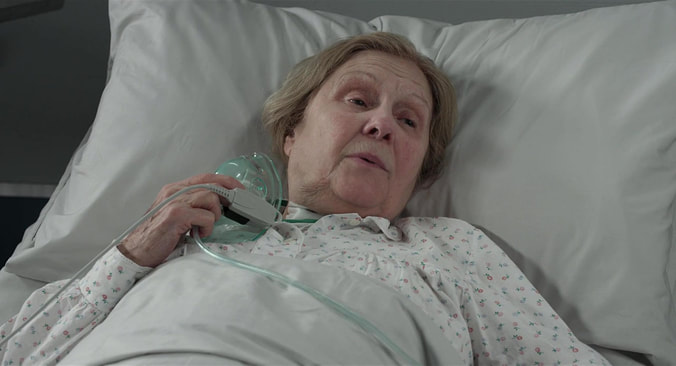MIA MADRE
*****
Director: Nanni Moretti
Screenwriters: Nanni Moretti, Francesco Piccolo and Valia Santella
Principal cast:
Margherita Buy
John Turturro
Giulia Lazzarini
Nanni Moretti
Beatrice Mancini
Stefano Abbati
Country: Italy/France/Germany
Classification: M
Runtime: 106 mins.
Australian release date: 5 May 2016
Considered a semi-autobiographical ‘dramedy,’ Nanni Moretti’s Mia Madre is a finely honed film that matches the emotional level of his 2001 Palme d’Or winner The Son’s Room. In this latest masterpiece, Moretti has created a subtle but profound portrayal of grief and loss which has such grace and clarity that you leave the cinema feeling as if you have just faced your own parent’s mortality.
Margherita Buy plays Margherita, a film director caught up in the middle of a fairly complex shoot about a strike against lay-offs in an Italian factory. The arrival of the lead actor, Barry Huggins (John Turturro), adds to her problems for he turns up from the USA with a heap of baggage, and I don’t mean Samsonite! He has a massive ego and a rather weird fixation for telling stories about the time he worked with his ‘friend’ Stanley Kubrick … yeah, right.
In the meantime, Margherita is struggling to come to terms with her ageing, bedridden mother’s physical demise and the guilt that comes with not being readily available to assist her, unlike her brother Giovanni (played by Nanni Moretti himself), who has taken extended leave from his job to attend to their Mama’s (Giulia Lazzarini) every need. Margherita is torn between the artistic side of her personality, which comes with its own set of problems, her floundering relationship with her own daughter, and the nagging feeling of regret that she is not devoting her energy in the right place at the right time.
The lead roles are all superbly played: Buy won Best Actress as the troubled daughter and Giulia Lazzarini Best Supporting Actress as her ailing parent at the David di Donatello Awards last year, Italy’s equivalent to the Oscars; Turturro is in fine form as the irritating but compelling Barry Huggins, the fish-out-of-water actor; and Moretti brings his usual gravitas and complexity to Giovanni, the son forced to rethink his entire career when faced with his mother’s mortality.
The music of Arvo Pärt, which makes up the lion’s share of the film’s soundtrack, adds a fitting emotional backdrop to the rich script. Mia Madre cleverly switches from pathos to comedy and back again as it delves into the decisions one must make when confronted with the death of one’s mother, yet it also manages to combine this with a story about filmmaking and the creation of cinema. In short, it is Italian cinema at its finest.
Screenwriters: Nanni Moretti, Francesco Piccolo and Valia Santella
Principal cast:
Margherita Buy
John Turturro
Giulia Lazzarini
Nanni Moretti
Beatrice Mancini
Stefano Abbati
Country: Italy/France/Germany
Classification: M
Runtime: 106 mins.
Australian release date: 5 May 2016
Considered a semi-autobiographical ‘dramedy,’ Nanni Moretti’s Mia Madre is a finely honed film that matches the emotional level of his 2001 Palme d’Or winner The Son’s Room. In this latest masterpiece, Moretti has created a subtle but profound portrayal of grief and loss which has such grace and clarity that you leave the cinema feeling as if you have just faced your own parent’s mortality.
Margherita Buy plays Margherita, a film director caught up in the middle of a fairly complex shoot about a strike against lay-offs in an Italian factory. The arrival of the lead actor, Barry Huggins (John Turturro), adds to her problems for he turns up from the USA with a heap of baggage, and I don’t mean Samsonite! He has a massive ego and a rather weird fixation for telling stories about the time he worked with his ‘friend’ Stanley Kubrick … yeah, right.
In the meantime, Margherita is struggling to come to terms with her ageing, bedridden mother’s physical demise and the guilt that comes with not being readily available to assist her, unlike her brother Giovanni (played by Nanni Moretti himself), who has taken extended leave from his job to attend to their Mama’s (Giulia Lazzarini) every need. Margherita is torn between the artistic side of her personality, which comes with its own set of problems, her floundering relationship with her own daughter, and the nagging feeling of regret that she is not devoting her energy in the right place at the right time.
The lead roles are all superbly played: Buy won Best Actress as the troubled daughter and Giulia Lazzarini Best Supporting Actress as her ailing parent at the David di Donatello Awards last year, Italy’s equivalent to the Oscars; Turturro is in fine form as the irritating but compelling Barry Huggins, the fish-out-of-water actor; and Moretti brings his usual gravitas and complexity to Giovanni, the son forced to rethink his entire career when faced with his mother’s mortality.
The music of Arvo Pärt, which makes up the lion’s share of the film’s soundtrack, adds a fitting emotional backdrop to the rich script. Mia Madre cleverly switches from pathos to comedy and back again as it delves into the decisions one must make when confronted with the death of one’s mother, yet it also manages to combine this with a story about filmmaking and the creation of cinema. In short, it is Italian cinema at its finest.
